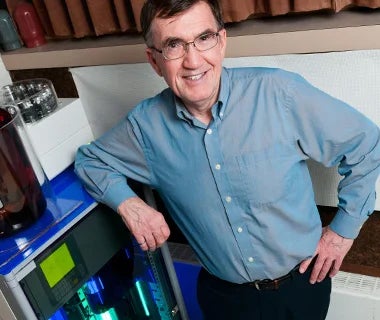Researcher Profile: Meet Peter Huck

Until his retirement on September 1, 2024, Peter M. Huck was a Professor in the Department of Civil and Environmental Engineering at the University of Waterloo and was the Natural Sciences and Engineering Research Council (NSERC) Industrial Research Chair in Water Treatment for 31 years, until the completion of the Chair in December, 2023. He plans to continue select research activities post retirement.
Professor Huck is a member of the Microplastics Fingerprinting project team, which consists of over 30 faculty members, masters and PhD students, and support staff from various disciplinary backgrounds. This diversity is a strength that enables a comprehensive evaluation of the challenges and solutions associated with microplastics. Each issue of our newsletter will feature a different member of the team.
As the Chair in Water Treatment, Professor Huck lead a team of professionals and graduate students in conducting leading edge research in various areas related to water treatment, including risk-based decision making. His team’s work included focusing on developing tools that utilities can use for assessing and quantifying treatment in terms of identified health risks.
Professor Huck has more than 100 refereed publications and several hundred conference proceeding papers. He has received several publication awards from the American Water Works Association (AWWA) including the 2008 A.P. Black Research Award. He received the George Warren Fuller Award from the Ontario Water Works Association in 2007 and the Albert E. Berry Medal from the Canadian Society of Civil Engineers. Additionally, Professor Huck received the Aquarina Award from the Polish Association of Sanitary Engineers for his research in the field of Natural Environmental Protection.
In the Microplastics Fingerprinting project, Huck’s team has been working on the drinking water component. His student, Jaita Saha examined the effectiveness of drinking water treatment processes to remove micro- and nano-plastics.
Importantly, Huck also brought several key partners to the project through the relationships that he has established through the Chair. These partners offer critical new insights, hands-on experience and a sophisticated understanding of the challenges and potential solutions to understanding the impact of microplastics on drinking water systems in Canada.